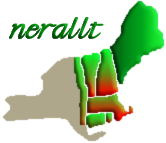NERALLT By-Laws
(updated 10-12-2012)
ARTICLE l: THE ASSOCIATION
Section 1: Name
The name of this self-governing organization is the New England Regional Association for Language Learning Technology, hereafter referred to as NERALLT. NERALLT is an official Regional Chapter (made up of the U.S. states of Connecticut, Maine, Massachusetts, New Hampshire, Rhode Island, Vermont and New York east of the Hudson River and north of Yonkers) of the International Association for Language Learning Technology, hereafter referred to as IALLT.
Section 2: Purpose
NERALLT is an organization for those concerned with the use and development of technology-enhanced teaching and learning spaces, methodologies, and research for languages, literatures and cultures.
Section 3: Membership
Any person sharing the purposes and objectives of NERALLT may become a member upon payment of fees as defined by the NERALLT Board. Members may attend meetings and vote. Membership shall apply to individuals only. Institutions are not eligible for memberships.
Section 4: Revenues
All revenues are to be used solely to achieve the purposes of the Association and are not to be used for the personal benefit of any member or private person.
ARTICLE II: GOVERNANCE AND OFFICERS
Section 1: Governance
The determination of policy and the direction of affairs of NERALLT are the responsibility of the Regional Board, whose members are elected and function as described in Section 2 below. Every member of the Regional Board must be a member in good standing of NERALLT; the President must also be a member in good standing of IALLT.
Section 2.0: Elected Officers
The officers of the Association who make up the Regional Board are President, President-Elect, Secretary, Treasurer, and Program Coordinator.
Section 2.1: President
The President presides at all meetings, conducts the business of the Association, and meets annually with the Board to discuss operational matters and plan for future advancement. The President also serves as liaison to the IALLT Regional Group Coordinator, and represents the region on the IALLT Council. The President assists the President-Elect through a smooth transition.
Section 2.2: President-Elect
The President-Elect presides in the absence of the President and assists with meeting programs and Association business at the direction of the President and Board.
Section 2.3: Secretary
The Secretary records and distributes minutes for the Association's business meetings and all Board meetings, and maintains the Association's files and records.
Section 2.4: Treasurer
The Treasurer oversees the financial affairs of the Association and prepares a financial report to be presented at the annual meetings.
Section 2.5: Program Coordinator
The Program Coordinator oversees the planning of annual meetings and acts as a liaison with affiliate organizations.
Section 2.6: Additional Officers
Section 2.6.1: The Immediate Past President serves as a board member for an additional two years [and is responsible for elections.]
Section 2.6.2: The Regional Board may appoint additional officers to be assigned duties as required for terms up to two years. These may include but are not limited to: Membership Coordinator, Newsletter Editor and Webmaster.
Section 2.6.3: Board Voting Rights — The immediate past president, president, president-elect, secretary, treasurer, and program coordinator vote as elected board members. Board voting privileges are extended to appointed officers unless otherwise stated at the time of appointment.
Section 3: Elected Office Terms
The term of office for all elected officers shall be two years. The President-Elect, after serving a two-year term,becomes President for the following two years. New officers begin their term prior to the IALLT meeting of the election year. No one may serve in any position for more than two consecutive terms.
Section 4: Elections
The election of officers is the responsibility of the immediate Past President, who solicits names for the ballots, submits a slate to the Regional Board for review, prepares ballots for the membership, and supervises the counting of ballots.
Section 5: Office Vacancies
Any vacancy, except that of the President, must be filled by a special election conducted by the immediate Past President. If the President must vacate the office, the President-Elect automatically becomes President.
ARTICLE III: MEETINGS
Section 1: General Meetings and Sites
There shall be at least two meetings each academic year, to be held at such time and place as the membership decides, where a program of interest is presented to the membership and a general business meeting is conducted.
Section 2: Board Meetings
There shall be at least one Board meeting per year, to be held at such time and place as the Board decides, where the Board shall discuss operational matters and plan for future advancement.
ARTICLE IV: AMENDMENTS
Section 1: Proposals for Amendments
Proposals for Amendments to the By-Laws may be suggested by members and shall be discussed at the annual Board meeting. Any such proposal, with the Board's recommendation, must be submitted to the membership in writing and voted on at the subsequent general business meeting; a 2/3 majority of members present is required to pass amendments.
